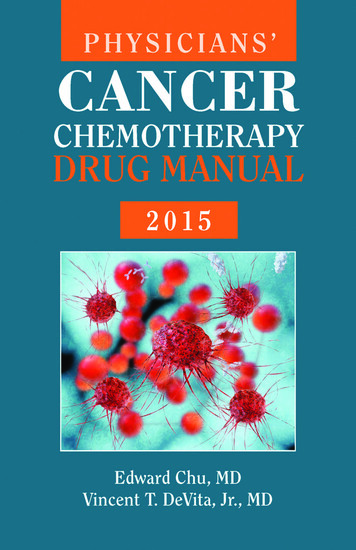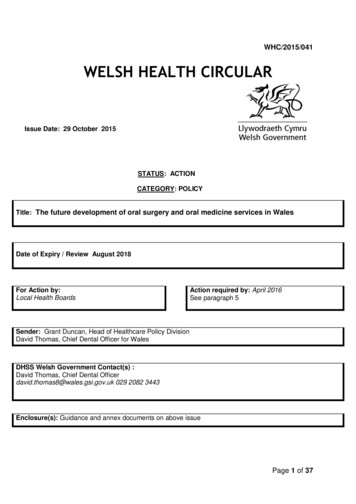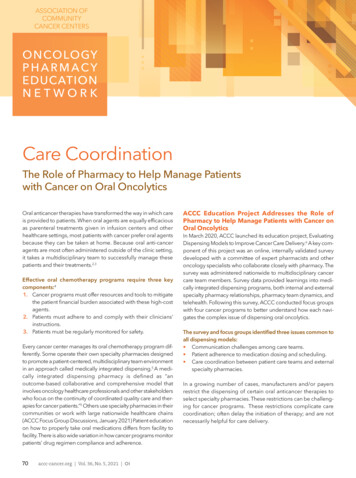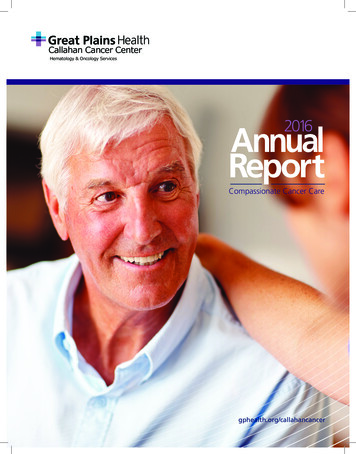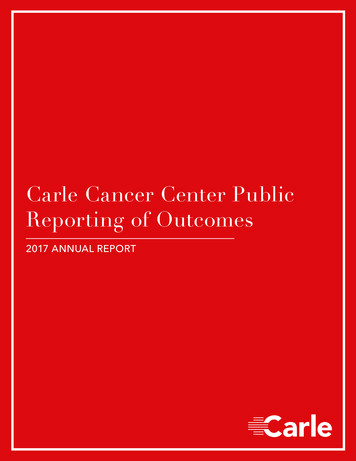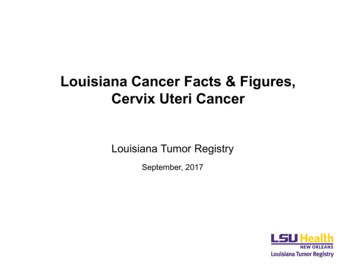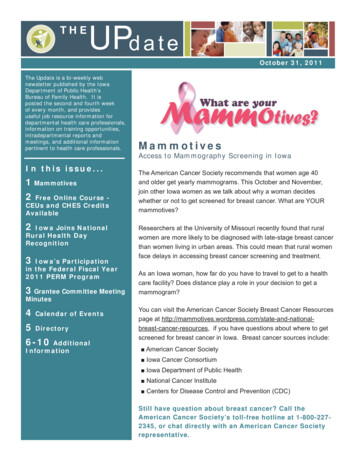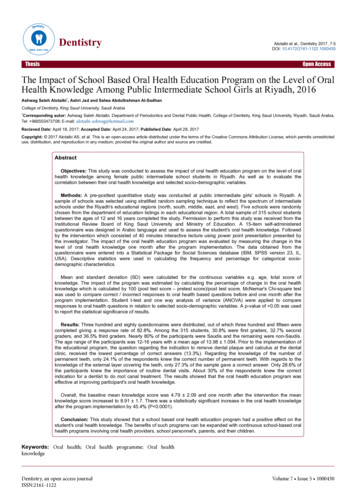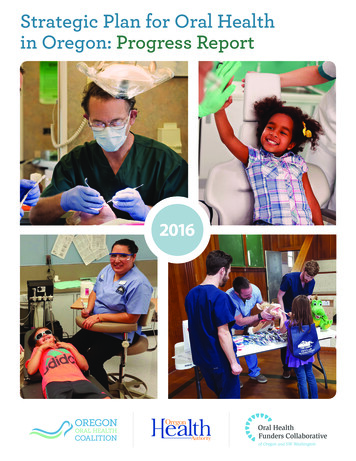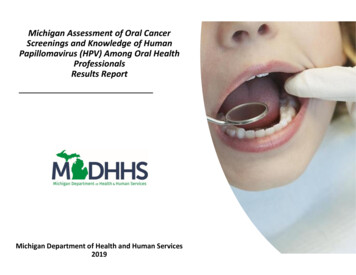
Transcription
Michigan Assessment of Oral CancerScreenings and Knowledge of HumanPapillomavirus (HPV) Among Oral HealthProfessionalsResults ReportMichigan Department of Health and Human Services2019
2019 Michigan Assessment of Oral Cancer Screenings and Knowledge of Human Papillomavirus (HPV) among Oral Health Professionals (OHP) Page 1Executive SummaryThe Michigan Department of Health and Human Services Oral HealthUnit was able to arrange for this assessment of oral health professionalsin our state, to help guide future initiatives on the education forscreening for oral cancer and promotion of the Human Papillomavirus(HPV) vaccine to prevent oral cancers.Much work needs to be done in educating more dental providers onwhen and how to provide oral cancer screenings, how to talk withpatients about HPV-related oral cancer and prevention of oral cancerwith the HPV vaccine series. Most respondents were dentists; may need more dental hygienists responsesfor more accurate picture.Good representation from across the state geographically.Many responders do not have a policy on oral cancer screening for theirpractices.Most all respondents indicated they do oral cancer screenings but when andhow varied.Contributors:Beth Anderson-MDHHS OralHealth EpidemiologistSusan Deming-MDHHS OralHealth Unit StaffChris Farrell-MDHHS OralHealth Unit DirectorAdvisory Team:Courtney Cole-MDHHSCancer SectionAngela McFall- MDHHSCancer SectionTaylor Olsabeck-MDHHSCancer EpidemiologistSteve Springer-MDHHSCancer Section Unit ManagerStephanie Sanchez-MDHHSImmunization Division Referring patients that had a suspicious lesion was a strong point for theserespondents as most had good practices on when and to whom to refer.Alyssa Nowak- MDHHSImmunization Division Information about the HPV vaccine was less known to these responders, somore education is needed on this topic.Jeff Johnston, DDS- DeltaDental Plan of Michigan Most respondents indicated they would welcome more education on thesetopics, especially HPV, as well.**Special thanks to Dan Sharkeyand Randy Schlichting fromScantron Survey Services forconsultation, dissemination ofthe survey and compilation ofresults.
2019 Michigan Assessment of Oral Cancer Screenings and Knowledge of Human Papillomavirus (HPV) among Oral Health Professionals (OHP) Page 2IntroductionDue to the rise in the incidence of Human Papillomavirus(HPV) related oral cancer, the Oral Health Unit andCancer Prevention and Control Section at the MichiganDepartment of Health and Human Services (MDHHS),brought together an advisory team in the fall of 2016.Along with the representatives from the Oral Health Unitand Cancer Prevention and Control Section, the teamconsisted of Delta Dental’s Chief Science Officer, andMDHHS Immunization Division. This team was able todiscuss the development of an assessment of Michigandental professionals on their practices for conductingoral cancer screenings, knowledge of HPV related oralcancers and HPV vaccines. In the subsequent year,Purposequestions were developed to ask dental professionals on Assess screening procedures for oral cancer byoral health professionals.these topics.The ultimate goal of this assessment is to increase thenumber of Michigan residents adequately screened fororal cancer, referred to specialists if indicated, andincrease the number of individuals vaccinated with theHPV vaccine. From the analysis of this assessment, plansfor education and guidance opportunities for dentalprofessionals will be explored. Assess the knowledge of oral healthprofessionals of oral cancer screening, HPV,and HPV vaccine. Determine if oral health professionals performany follow up after identifying patients withsuspected oral cancers. Determine if oral health professionals arewilling to discuss HPV, its connection to oralcancer, and/or promote the HPV vaccine.
2019 Michigan Assessment of Oral Cancer Screenings and Knowledge of Human Papillomavirus (HPV) among Oral Health Professionals (OHP) Page 3MethodsOn July 9, 2018 a paper survey was mailed to 5,000Michigan dental practices identified from a Delta Dentalof Michigan contact list.The MDHHS advisory team developed questions thatwould help answer the topics listed in the purposesection. The formatting of the hard copy survey and themailing, which included a 2 bill as an incentive, wasconducted by Scantron Survey Services.The participants were given until August 6, 2018 to mailin their responses. Scantron scanned the responses andsent the data file to MDHHS for analysis. SPSSstatistical software was used for data cleaning andanalysis.Survey Response Rate:1,656 (33%)
2019 Michigan Assessment of Oral Cancer Screenings and Knowledge of Human Papillomavirus (HPV) among Oral Health Professionals (OHP) Page 4Results:Oral Health Professional title: 89.0% were dentists 6.2% were dental hygienists 3.4% were dental assistantsSetting they spent the most time in: General Dental Practice: 83.6% Specialty Practice: 8.8% Federally Qualified Health Center (FQHC): 3.0% Academic Institution: 0.9% Dental Service Organization: 0.5% Hospital Based Clinic: 0.2% Local Health Department: 0.2% Other: 1.0%Number of years in practice 0-10 years: 19.8% 11-20 years: 14.3% 21 years: 58.2% No longer practicing: 0.9%Practicing Zip Code Location
2019 Michigan Assessment of Oral Cancer Screenings and Knowledge of Human Papillomavirus (HPV) among Oral Health Professionals (OHP) Page 5Does your office have a written policy on screening for oral cancer?7060 A quarter of oral health professionals (OHP) (25.8%) reportedhaving a written policy for oral cancer screening in theiroffices.Percent (%)5040 62.9% did not have a policy and 8.1% were not sure of theiroffice oral cancer screening policies.3020100YesNoDon’t knowOn which patients do you perform an oral cancer screening?* 1,172 oral health professionals perform oral cancer screeningson all their patients.1400 401 perform oral cancer checks on all their adults patients, 42on new patients only, 49 on patients with a history of cancerand 55 on patients who request it.1200Number1000 Only 27 OHP reported they do not perform oral cancerscreenings on their patients.8006004002000All patients All entswhorequest it*Question was to check all options that applied to their practice.NoneOther Other/Comment n 48 Various ages mentioned Appointment type (initial exam, 6 month exam) Patient types (etiologic factors, suspicious lesions,history of cancer, smokers, drinkers, only those withconcerns. 27 indicated they screen none of their patients, the mostcommon reason was that it was outside of their scope ofpractice.
2019 Michigan Assessment of Oral Cancer Screenings and Knowledge of Human Papillomavirus (HPV) among Oral Health Professionals (OHP) Page 6If you perform oral cancer screenings, how often do you perform these?6050 Almost half (48.4%) of oral health professionals performoral cancer screenings at every visit. One in five (18.9%) perform them once a year on theirpatients. One-third responded as having an other schedule:Percent (%)403020 Some respondents indicated they only perform this only on peoplewith a history of oral cancer, only on people who smoke or usetobacco, every 2 years, or every 5 years.100Every visitOnce a yearPatients with historyOtherWhich of the following do you use to screen for oral cancer?*1600 The most frequently reported screening used was a visualassessment plus tissue palpations (n 1,418).14001200 The second most used screening was the questions on thehealth assessment questionnaire (n 860).Number1000800 About 400 only use a visual assessment, 230 use a speciallight or equipment (ie. Velscope) and 82 use a brush test toscreen their patients for oral cancer.6004002000Health Visual only Visual plusassessmenttissueLightBrush test*Question was to check all options that applied to their practice.Do notscreenOther
2019 Michigan Assessment of Oral Cancer Screenings and Knowledge of Human Papillomavirus (HPV) among Oral Health Professionals (OHP) Page 7When performing an oral cancer screening, mark areas you check routinely.*Tongue and gauze:1,466 (88.5%)Double-digit probe:881 (53.2%)Throat ahhh:1,326 (80.1%)Lip and cheek roll:1,374 (83.0%)Palate tickle:612 (37.0%)Neck caress:1,075 (64.9%)Six Step Screening pictures courtesy of Eva Grayzel, www.sixstepscreening.org*Question was to check all options that applied to their practice.
2019 Michigan Assessment of Oral Cancer Screenings and Knowledge of Human Papillomavirus (HPV) among Oral Health Professionals (OHP) Page 8Number of areas the oral health professionals reported checking routinely500450Number of OHP400 131 oral health professionals reported they do not check anyof the areas routinely.350300 431 oral health professionals reported checking all 6 areasroutinely on their patients.2502001501005000123456Number of areasThe oral health professionals reported checking anaverage of 4 of the 6 areas
2019 Michigan Assessment of Oral Cancer Screenings and Knowledge of Human Papillomavirus (HPV) among Oral Health Professionals (OHP) Page 9Please rate your comfort level with doing an oral cancer e0% 1,441 (88.6%) oral health professionals felt comfortable orvery comfortable with doing oral cancer screenings. Only 11 (1.8%) oral health professionals reported beinguncomfortable or very uncomfortable doing oral cancerscreenings.Very comfortable54%Comfortable34%After performing an oral cancer screening, and finding a suspicious lesion, what doesyour office normally do?1600 1400 120010008006004002000NothingNot applicable Refer to providerOtherRefer to surgeonThe majority of oral health professionals (90.7%) referpatients with a suspicious lesion to an oral surgeon.Just over 100 oral health professionals indicated ‘other’and responses included: 2 week re-eval before referral biopsy lesion first and then refer take photo, document well, etc. refer to PCP if required by insurance Some of the respondents were oral surgeons so theylisted “do biopsy”, or “treat”.
2019 Michigan Assessment of Oral Cancer Screenings and Knowledge of Human Papillomavirus (HPV) among Oral Health Professionals (OHP) Page 10To assess your knowledge on Human Papilloma Virus (HPV) and HPV vaccines, pleaseanswer true or false to the statements below.StatementAbout one in four individuals are currently infected withHPV in the United States.HPV infection can cause cancer in the back of the throat,including the base of the tongue and tonsils (calledoropharyngeal cancer).Most children who are 11 or 12 years old should get twoshots of HPV vaccine six to twelve months apart.True1,291False224 1,54521 1,349149 Adolescents who receive their two shots less than fivemonths apart will require a third dose of HPV vaccine.981442HPV vaccine is recommended for young women throughage 26, and young men through age 21.1,324186Number of Oral Health Professionals800 700600 500400300200100001234Number of Statements Answered Correctly5All of the statements provided weretrue statements at the time of thesurvey.The statement most oral healthprofessionals got correct was how HPVinfection causes oropharyngeal cancer.The statement that most oral healthprofessionals got incorrect was thatadolescents will need a third shot ifthe first two were administered lessthan five months apart.431 oral health professionalsanswered all five statements correctlyas true.None of them answered all incorrectlyas false, however, 79 chose not tocomplete this section of the survey.
2019 Michigan Assessment of Oral Cancer Screenings and Knowledge of Human Papillomavirus (HPV) among Oral Health Professionals (OHP) Page 11Please rate your agreement with the following statements.Dental providers shoulddiscuss HPVvaccines with their patientsDental providers shoulddiscuss HPVvaccines with parentsThere is adequate time todiscuss HPV vaccinesduring our office’s dentalappointmentsI have adequateknowledge about HPVvaccine to discuss it withpatients/parents.I have questions about theHPV vaccinesI am comfortablediscussing the HPVvaccines withpatients/parentsI know where to sendpatients to get the HPVvaccineStronglyDisagreeDisagree59Neitheragree 1.3%) Only 375 (22.6%) of oral healthprofessionals indicated they had adequateknowledge about HPV vaccinations todiscuss it with their patients. 640 (38.6%) of OHP disagreed with thestatement of being comfortable discussingHPV with their patients. Over half of OHP agreed that they knewwhere to send their patients to get t/uploads/2018/04/DENTAL-Action-Guide-WEB.pdf
2019 Michigan Assessment of Oral Cancer Screenings and Knowledge of Human Papillomavirus (HPV) among Oral Health Professionals (OHP) Page 12Which patients do you routinely ask or advise to receive HPV vaccines?* I do not routinely ask or advise patients to receive HPV vaccine-1,362Parents of children and adolescents-127Children and adolescents- 107Young adults-106Parent of young adults-49All patients- 47Other-18 We have literature on the counter Refer to their family physician if not vaccinated Discuss abstinence first I typically do not see patients in this age range If parents ask my advice I tell them to get it I have had resistance to this due to religious or valuesdifferences with patients Only in presentations Patients who ask*Question was to check all options that applied to their practice.
2019 Michigan Assessment of Oral Cancer Screenings and Knowledge of Human Papillomavirus (HPV) among Oral Health Professionals (OHP) Page 13What are your suggestions for educational resources on oral cancer, HPV, and HPVvaccines for oral health professionals?* *Question was to check all options that applied to their practice.CE course- 1,314Informational pamphlets and fact sheets-1,041Webinars- 861Professional resources (i.e. ADA)- 752Reference cards- 584Patient resources- 475Conference workshops-242Education curricula-241Onsite refresher trainings- 235Inter-professional resources- 185None needed-16Other- 21 Most or all of the above Commercials/TV ads for the public Demonstrations on how to talk topatients/parents Insurance covered (ie. D0431) Various publications
2019 Michigan Assessment of Oral Cancer Screenings and Knowledge of Human Papillomavirus (HPV) among Oral Health Professionals (OHP) Page 14Other comments on your office practice for screening for oral cancer, knowledge and/orpromotion of HPV related cancers and vaccine.Over 180 open comments were submitted that were quite varied in nature. Below aresome examples: This is not the place to discuss this matter. Patients and parents will be offended. This is more of aprimary healthcare provider issue. I have not been promoting the HPV vaccine as much as I should. I will be changing that policy in myoffice shortly. I wish I was more familiar and more informed, and would welcome any improvement in increasingthe knowledge for myself and all dentists. What I do know about HPV is that it is a venereal disease. Prevention should be abstinence andmonogamy and that is not my personal view. Risks of oral cancer and HPV vaccine are not part of my typical health review with patients. But afterthis survey I realize it should be and can put into our health review-oral exam discussion. THANKYOU. We are NOT doctors or gynecologists, etc. Each physician should be prescribing vaccines, not dentist. I screen all patients but don't consulteach client about things their physicians should do. Oral cancer screenings including HPV should be included in insurance benefits in order to haveadequate discussions with patients. I would like more pre-printed patient education to give to parents. I would like to know more about HPV vaccines. I feel we are aggressive in our present scanning fororal lesions but I am not knowledgeable about HPV vaccines.
2019 Michigan Assessment of Oral Cancer Screenings and Knowledge of Human Papillomavirus (HPV) among Oral Health Professionals (OHP) Page 15Conclusions:Oral health professionals are the best health providers to screen fororal cancer. A screening for oral cancer is an expected part of thecomprehensive oral exam. Discussing HPV-related oral cancer and thebenefit of the HPV vaccine in the dental setting could help increaseimmunization rates and reduce the occurrence of HPV-related cancersin the state of Michigan.From this assessment of Michigan oral health professionals, weconclude: There are varied practices on screening for oral cancer, on whom toprovide a screening, the areas of the oral cavity screened, andwhen to provide a screening. 62% of oral health professionals do not have a written policy oroffice procedure on screening for oral cancer. 82% of oral health professionals do not routinely ask or advise onthe HPV vaccine. Many had a wrong answer or did not respond to True/Falsequestions on the HPV vaccine. There were strong suggestions for more continuing education (CE)opportunities on oral cancer, HPV-related oral cancers, and how totalk with patients about the HPV vaccine.
2019 Michigan Assessment of Oral Cancer Screenings and Knowledge of Human Papillomavirus (HPV) among Oral Health Professionals (OHP) Page 16Next Steps/Recommendations Offer the survey again to just dental hygienists, as they are normally the provider that would do oralcancer screenings Develop sample policy form/statement on screening for oral cancer for dental settings to use Offer more education opportunities to oral health professionals on oral cancer, HPV-related oralcancers and HPV vaccines Develop chairside education materials for talking with patients about HPV vaccines Provide a public awareness campaign about HPV-related oral cancers Include invitations to dental providers regarding conferences, summits, and educational sessions onHPV-related topics Promote coding and reimbursement mechanisms for oral cancer screening
2019 Michigan Assessment of Oral Cancer Screenings and Knowledge of Human Papillomavirus (HPV) among Oral Health Professionals (OHP) Page 17For more information: MDHHS Oral Cancer Fact Sheet: www.michigan.gov/oralhealth Michigan.gov/oralhealth: www.michigan.gov/oralhealth e-mail: oralhealth@Michigan.gov Michigan.gov/immunizations: https://www.michigan.gov/mdhhs/0,5885,7-339-73971 4911 4914---,00.html Michigan Cancer Consortium: https://www.michigancancer.org/ The American Cancer Society Michigan: l HPV Roundtable: www.hpvroundtable.org The Oral Cancer Foundation: https://oralcancerfoundation.org/ The Centers for Disease Control and Prevention (CDC): https://www.cdc.gov/cancer/headneck/index.htm The American Dental Association: d-oral-cancer National Cancer Institute: https://www.cancer.gov/** Special thank you to The Delta Dental Foundation, an affiliate of Delta Dental ofMichigan, Ohio and Indiana, for consultation and financial support for this project!
Courtney Cole-MDHHS Cancer Section Angela McFall-MDHHS Cancer Section Taylor Olsabeck-MDHHS Cancer Epidemiologist Steve Springer-MDHHS Cancer Section Unit Manager Stephanie Sanchez-MDHHS Immunization Division Alyssa Nowak-MDHHS Immunization Division Jeff Johnston, DDS-Delta Dental Plan of Michigan **Special thanks to Dan Sharkey
